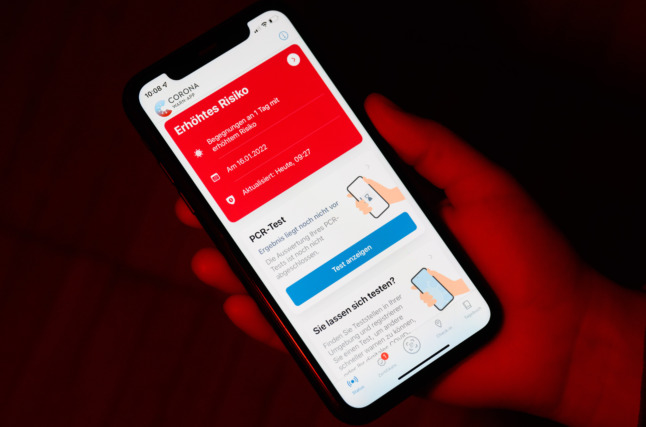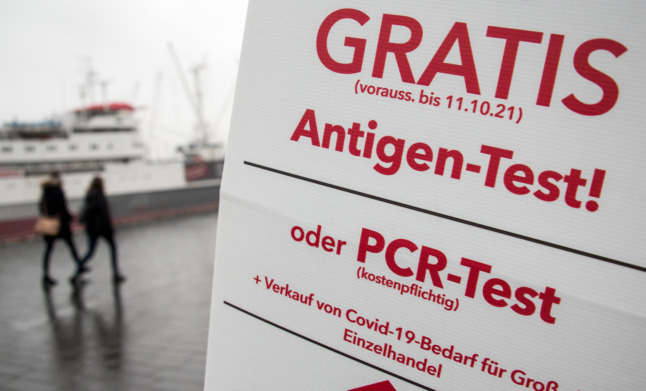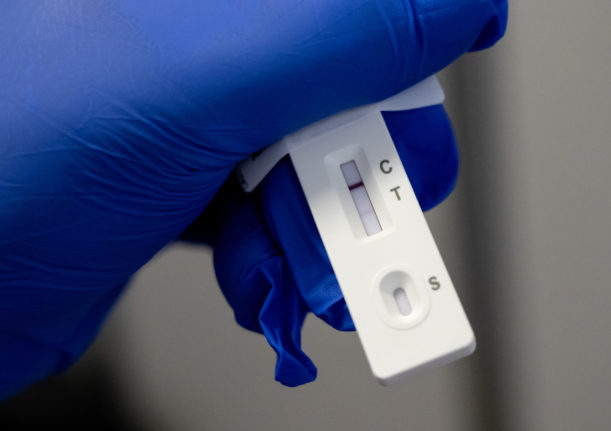Why are tests being restricted?
Germany’s infection rates have been spiralling over the past few weeks, hitting new all-time-highs on a daily basis. At the time of writing on Wednesday, the 7-day incidence of Covid infections was 940 per 100,000 people – a massive jump from the figure of 584 recorded just a week ago.
In Berlin, the current Omicron hotspot, the 7-day incidence of infections is currently almost 1,800 per 100,000 residents.
These high incidences are matched by record daily cases. On Wednesday, around 164,000 new Covid infections were reported within a day. But due to limited testing capacities and staffing issues at local health authorities, this could be an underestimation.
Though severe courses of Omicron are believed to be rarer than with the previous dominant variant Delta, experts say that current wave is nowhere near its potential peak. Health Minister Karl Lauterbach (SPD) believes that the country could record as many as 400,000 new cases a day by February.
Against this backdrop, the government wants to restrict the availability of PCR tests in order to ensure that there are enough tests for people who need them.
What’s the current testing capacity?
According to recent data from the Association of Accredited Laboratories in Medicine (ALM), 2.4 million PCR tests were carried out in Germany last week. One in three tests were positive, they confirmed, and the proportion of positive samples is rising week-on-week.
Currently, the laboratories are working at around 95 percent capacity, meaning that just a small increase in infections or staff shortages could lead to testing centres becoming overwhelmed.
The government has promised to expand these testing capacities to cope with the Omicron wave, but it also wants to introduce restrictions.
OK, so can I still get a free PCR test?
Currently, anyone with Covid symptoms, a positive antigen test or a red alert on their Corona Warn app can get one for free on their health insurance or by visiting a state testing centre.
But this looks set to change.
In future it will depend on your profession and your health. Only people who fall into a ‘risk’ category – i.e. someone who is elderly or has pre-existing condition – and those who work with vulnerable groups will be able to get a PCR test for free.
Specifically, the new ordinance mentions staff “in hospitals, in surgeries, in nursing and in institutions for integration assistance”.
Of course, if you’re happy to pay for one, you may be able to still get a PCR test with a private provider – these tend to cost upwards of €40 per test.
READ ALSO: KEY POINTS: How Germany will tackle latest phase of the Omicron wave
How does this affect quarantine and self-isolation rules?
That’s a tricky one to answer, since normally a PCR test is required to confirm an infection – but a potential rule-change could be on the cards. In future, people who don’t belong to a risk group could require two positive antigen test results to confirm a Covid infection and self-isolate.
The same is likely to apply for proving a past Covid infection, though once again nothing concrete has emerged yet.

In addition to rapid tests, the government is pinning its hopes on so-called Poc-NAAT tests to help bolster its testing capacity. There should soon be one million more of these tests – which are allegedly around 10 times more accurate than rapid tests – available per week. The use of these may be restricted to people with Covid symptoms, but again nothing firm has been worked out yet.
In terms of getting released from self-isolation, the government is making a tweak to its recently changed quarantine rules. This will mean that people who work in hospitals and care homes will soon be able to use a rapid test to release themselves from quarantine after a week – just like everyone else. Previously, the government had required a PCR test for this group.
READ ALSO:
- ANALYSIS: Are Germany’s Covid rule changes backed up by science?
- EXPLAINED: Germany’s new rules and exceptions for Covid quarantine
Can we still track Covid figures if we are restricting tests?
That’s a very good question. According to information obtained by the Redaktionsnetwerk Deutschland (RND), the Federal Ministry of Health is currently working with the Robert Koch Institute (RKI) on a new system for calculating infection rates.
Antigen test results are currently forwarded onto the RKI, but are only included in official statistics if accompanied by a positive PCR test result.
“Whether and in what form antigen tests will be included in the statistics in future is currently being examined,” the RKI told RND.
In other words, it is possible that antigen test results will also be used to help calculate the Covid incidence in future – though the RKI would have to take into account the lower accuracy of these tests in its modelling.
When are the changes coming into force?
That we don’t know yet. The Health Minister and his state colleagues are still working out the details at the moment so keep in mind that there could be room for slight changes in the finished legislation.
It is then likely that states would adopt measures, and there can be variations among state regulations.



 Please whitelist us to continue reading.
Please whitelist us to continue reading.
>Can we still track Covid figures if we are restricting tests?
That’s a very good question. According to information obtained by the Redaktionsnetwerk Deutschland (RND), the Federal Ministry of Health is currently working with the Robert Koch Institute (RKI) on a new system for calculating infection rates.
They will just guess. And the numbers will always be going up at alarming rates. Even when they fall. They are just going up in reverse.